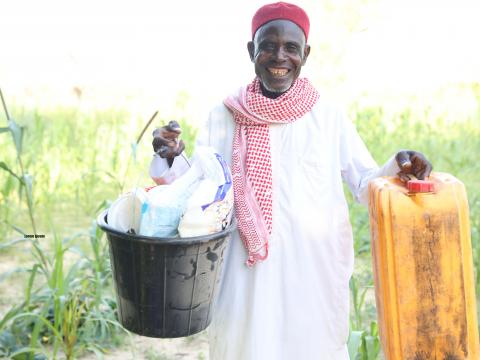"I really needed this support; now all my children can sleep under a mosquito net."

Niger has been facing floods since the beginning of August, the disasters causing several material damages and affecting the lives of vulnerable populations. In Zinder, Elhadji Bako Katchalla remembers that August morning when he and his fellow community members tried to do everything to prevent water from invading their village (Lélari).
“The rain was heavy last night. At 6:00am when the flood started, we gathered in front of the village to organise ourselves and make sure to keep the water from flooding our houses. We filled sandbags and placed them in front of the village. "
At the end of their rope, the villagers gave up on trying to save what was left in their homes, and rather save their own lives first. In Lélari, 80 households, most of them farmer households, were affected by the floods. Their fields and houses were submerged in water. A total of 119 fields were flooded.
“Despite our efforts, we could not prevent our village from being flooded. We started to take our belongings out of the houses, but we were only able to save few things. This is how I lost my house. My children and I had difficulty sleeping at night due to the lack of mats, and the mosquito nets were insufficient. We used to have to split a single mosquito net between six people. We were so packed inside, that sometimes some of us decided to sleep outside of the mosquito nets." Elhadji continues.
He adds: "I am a farmer. I work in the field with seven of my children. My field was completely flooded, I noticed the damage a few hours later when we went back."
Like many others in his village, the father of 12 cultivates millet, sorghum and beans in his field. With the rainy season already well advanced in the region, farmers had already ploughed their fields. Thus, they experienced great losses following the impact of the floods on their crops. For Elhadji, this means a loss of approximately 700,000 CFA Francs ($ 1,400) from the sale of the beans and sorghum.
“Habitually, millet is reserved for our personal consumption and we sell beans and sorghum. With that money, we pay for clothes for children, school supplies and condiments for the house.’’
After a very challenging period, it was with great relief that Elhadji as well as his community received a donation of non-food items consisting of mats, treated mosquito nets, buckets, soaps and cups: "I really needed this support, I no longer have to worry about children getting malaria, now all my children can sleep under a mosquito net. I really thank the donors”. He told us with a smile.